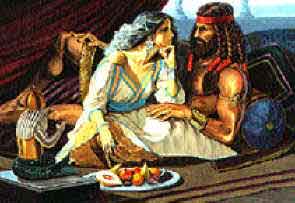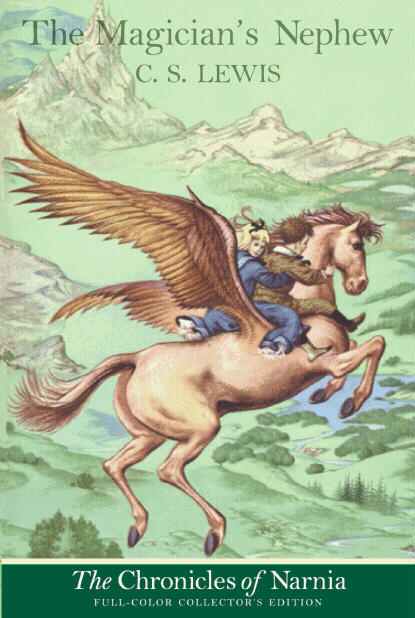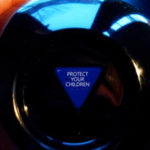What If Your Kids DO Read Fantasy?
Is there a line that fantasy literature or speculative fiction in general can cross? I know some parents steer clear of the genre (see Friday’s guest article by Marian Jacobs) for just such a reason—there might be “evil things” that my child will read about, and I need to protect him from such.
Good parenting does mean the adults will make decisions on behalf of the child to protect him. “Hold my hand when we cross the street, Honey.” “Matches are not play things.” “We’ll keep the training wheels on until you’re a little older.”
Besides protecting children physically, parents also should protect their children emotionally and spiritually. Consequently, there are certain things that are not “age appropriate” that are on the internet, TV, Netflix, movies.
We seem fine with movie ratings that tell us which ones might have content that is not suited for small children, or even for young teens. Why, then, would not the same be true about books?
Not that I’m advocating rating systems. Those are only as good as the people doing the ratings and the standards they use. It’s pretty hard to insure their opinion will dovetail with each of ours. More than that. Rating systems take the responsibility off the shoulders of parents, where it belongs.
Parents should be aware and involved in the thought life of their children, and what they read feeds into their thoughts as much, if not more, than what they see.
So, what’s a parent to do, who has heard from this source or that, that fantasy is evil, yet their child wants to read the hot new book that all her classmates are reading, which just happens to be a fantasy?
I think there are some simple steps to take.
- Resist the temptation to make a decision about fiction based on “what everyone is saying.” Simply because someone says Harry Potter is teaching witchcraft or is opposed to Christian truth, resist concluding that therefore Harry Potter is a book your child should not read or that all fantasy is taboo.
- Read the books yourself. If your child wants to read a book you’ve heard about but aren’t sure about, either read it first or read it with your child.
- Ask yourself what is true in this book, what is beneficial and then what is questionable or detrimental. Can a reader learn from the negative as well as the positive?
- Engage your child in conversations about the various elements in the book. We can learn much about what children need, not by lecturing them out of context, but by asking them questions about characters they are invested in. Should Harry have done that? (since I’m using the Harry Potter books as examples.) What does Harry do that is consistent with the teaching of Scripture? How should he react to teachers who have questionable ethics or behavior? To fellow students?
 I’d also add, resist the urge to turn reading into a lesson each and every time you discuss it. Sometimes it’s good to hear what your child liked in the chapter you read, what made the most impression on them, what they think will happen next.
I’d also add, resist the urge to turn reading into a lesson each and every time you discuss it. Sometimes it’s good to hear what your child liked in the chapter you read, what made the most impression on them, what they think will happen next.
But when are kids “too old” to be read to? For years I read to my 7th and 8th grader English classes every Friday afternoon. I suspect kids are too old when they lose interest in having an adult read to them. That doesn’t mean a parent shouldn’t also read the books they read, preferably before they do.
The point here is simple. Sometimes kids will come across something “objectionable,” something you’d rather they didn’t have to deal with, but would you rather have them deal with it on their own, in real life, without your guidance, or through fiction in conjunction with your counsel? In other words, “bad things” aren’t always “bad” in books, in the sense that your child shouldn’t be exposed to them.
 I know comparing the Bible to fiction is often a tired argument, but when we talk about allowing kids to look at the real world and to give input into their conclusions, I think the Bible is an accurate comparison to fiction. Should we keep kids from knowing that King David committed adultery? that Samson was a womanizer? that Moses killed a man? At some point the Bible “stories” have to become connected to real life. Otherwise “do this” and “don’t do this” will never make sense. Our children will miss what God was doing in the lives of the people they read about in Scripture.
I know comparing the Bible to fiction is often a tired argument, but when we talk about allowing kids to look at the real world and to give input into their conclusions, I think the Bible is an accurate comparison to fiction. Should we keep kids from knowing that King David committed adultery? that Samson was a womanizer? that Moses killed a man? At some point the Bible “stories” have to become connected to real life. Otherwise “do this” and “don’t do this” will never make sense. Our children will miss what God was doing in the lives of the people they read about in Scripture.
So with fiction and in particular, fantasy, children need to come to a point where they understand heroes have flaws and need to seek forgiveness or help or hope for the future. Evil happens and should be exposed as evil, not brushed under the rug or ignored as if it wasn’t there.
You as an adult can give them guidance about things like magic and wizardry. You can ask them if they think they could ever do the things Harry Potter does. In other words, you can be sure they have a good grasp of what is pretend and what is real.
But of course, that implies that each of us has thought through the issues of the imaginary, the make-believe, the faery tale versus the real. I suppose that needs to come first.












































I’m know I’m repeating myself, but I feel like I have to be the modulating voice that says, “your kids are going to have different opinions than you,” because it gets erased in this push to “train up” your child into an ideological clone of yourself. I’m not talking opinions like they prefer blue to red, I’m talking opinions like literalist interpretations of the Bible are bunk and gay people are just fine.
Notleia, obviously you have strong feelings about your own background, but I think you read into others’ lives what you experienced. Consequently in this post I said “guide” and you hear “ideological clone.”
You would expect a parent to teach a child not to stick his finger in a light socket or not to get in a car with a stranger. Why shouldn’t parents also be just as involved in warning and teaching children about spiritual things? It would be foolish for us to think that what is temporal is fine for us to be involved in, but when it comes to the eternal, it should be hands off.
As far as what “opinions” a parent should or should not pass on to their children, I prefer the Truth. Yes, there are also a good deal of “how do we live that Truth out” kinds of specifics that parents also pass on. But if they do a good job, children will settle on their own “how to” without rejecting the Truth it’s based on.
You mentioned “literalist interpretations of the Bible.” You might be surprised, but I agree. For instance, I just heard a woman speaking on marriage who says those in conflict should go to bed angry. But the prevailing literalist view is that the Bible teaches not to go to bed mad. It doesn’t. In context it is clearly teaching to be angry and yet to not sin. So if going to bed and getting needed sleep makes a person less emotional, more clear-headed, rational and willing to work through whatever relational problem exists, then that’s a better option than slavishly staying up til all hours of the morning so as not to go to bed mad. Going to bed with the intent to stew in his anger or to plot revenge or other such sinful reactions—that’s another matter.
The point is, what the Bible says needs to be taken in context and understood in light of the genre and purpose of each book. One friend says the Bible needs to be interpreted literarily, not literally.
In short, the Bible isn’t a rule book. It’s revelation, and we need to treat it that way. What is God like? What does He care about? A parent would be wise to pass those things on to their children, along with, “Look both ways before you cross the street.”
Becky
I think the internet eated my earlier comment, but that’s okay because I’ve discovered I have more to say.
But first I made a funny about how I’m stealing that analogy: Christian culture teaches kids that sex is like sticking your finger in a light socket. (’cause let’s be real, parents are mostly screening books/media for sex)
But the substance of what I want to say is that intent isn’t magic. Even if a parent means well, that doesn’t mean their kid won’t end up experiencing their own childhood as being tightly controlled (ie, clone-making).
This isn’t contradicted by my experience of Christian parenting media, which basically is all about controlling your kids and what your kids are exposed to. I guess they think that imposing external controls automatically teaches your kids to have internal controls, but that’s not true. In my experience and a bunch of other people’s experiences.
Also for interpreting the Bible literarily, I find that most Christians don’t really understand what that entails, but that’s a different essay-length comment.
Notleia, just a reiteration that your experience isn’t universal. I taught in a Christian school for over thirty years, so I saw lots of Christians doing their best to raise their kids to be followers of Jesus Christ.
I didn’t see anything like you say you experienced. Sex was not treated as a dirty word in the classrooms, certainly, and barring one family, it’s hard for me to imagine even the most involved parent having a negative view about sex.
On the other hand, they also didn’t encourage their kids to go out and experiment! Rather, if you stick with the truth revealed in the Bible, it’s pretty easy to have a balanced, healthy view of sex.
My concern here is that you automatically think sex is the issue. Is that because you have never come to terms with your views? I mean, I know a lot of parents are concerned about language, attitudes toward authority, violence, friend choices.
What parents are concerned with is keeping their child from harm, spiritually and emotionally. There is no need for a five year old to be exposed to certain things that are beyond her years. In the same way, there is no need for a twelve year old to be exposed to certain things. Those things are different from the five year old’s list. You don’t need to put safety caps on the electrical sockets in a twelve-year-old’s room.
So if that’s what you experienced, I’m sorry. It is not universally true that “the Christian community” does so. From what you say, it sounds like you’re “throwing the baby out with the bath water.”
Becky
Except it’s not just me. This is a systemic problem. Here, have some more anecdotes: http://www.patheos.com/blogs/removingthefigleaf/
I guess what I’m trying to tell you, notleia, is that I don’t believe it is systemic. I’ve had a pretty wide range of experiences with young people, and what you are saying simply doesn’t reflect their existence. Some of those kids, raised in Christian homes are now raising their own kids the same way because they think it’s right. Some have left the church and have turned from the faith, but I haven’t heard any of them say their lives were onerous because of the way their parents raised them.
I know there are some negative experiences, no doubt. But that doesn’t mean the negative reflect all Christians or even most Christians. I do know there are cultural differences base on parts of the country, so perhaps you live in a place that has a more works-oriented way of framing Christianity.
Becky
Children definitely have different opinions from their parents(I know I have vastly different opinions than mine on certain things) but everyone is going to teach their kids according to what they believe, regardless of being Christian or not. If you had your own kids, you would probably teach them according to your own views on sex, media, etc. and probably have negative reactions if they deviated from those in a way you disliked. You would probably ultimately let them choose what they did, but you would have an opinion about it and probably tell them that you disagreed if, say, your children had a more conservative view on sex than you did. It’s exactly the same thing with Christians. We don’t expect children to be our clones and agree with us, but we do have our opinions and all parents teach according to their opinions to some degree or another.
As much as I appreciate you trying to be moderate and all, I’m thinking about gay kids who are thrown out of their homes or tortured in gay conversion therapies by their religiously motivated parents. If there is a good way to be moderate about that, I have not yet discovered it.
notleia, there are people who respond incorrectly, but there are also people who properly guide their children away from sin. That’s part of a parent’s job, as surely as it is their job to keep them from physical danger.
And the idea that conversion therapies are torturing kids is narrative the LGBT community wants to put forth. And there may be some such groups, but that’s not consistent with their aims, for sure.
I find it interesting that no one really wants to explain why someone like Dr. Rosaria Butterfield can leave the gay life, marry, and live a heterosexual life if people supposedly can’t be transformed from being gay.
Becky